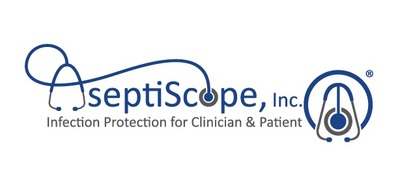Subject: TRI
New Study in Mayo Clinic Proceedings Shows AseptiScope DiskCovertm Barriers Completely Block Patient Exposure to Clostridioides difficile on Stethoscope Diaphragms
SAN DIEGO, Jan. 19, 2021 /PRNewswire/ -- A new study in Mayo Clinic Proceedings entitled "Aseptic Stethoscope Barriers Prevent C. difficile Transmission In Vitro"2 finds that aseptic disk covers from AseptiScope, available now commercially in the company's flagship product, The DiskCover Systemtm, completely blocked the growth of C. difficile on stethoscope diaphragms. C. difficile infection (CDI), a significant public health issue, was estimated by the CDC in 2015 to result in nearly 500,000 infections and contribute to over 30,000 deaths and $4.8B in excess acute care costs.1 C. difficile is an anaerobic gram-positive bacterium that generates infection-causing spores that are highly resistant to commonly used heat and alcohol disinfectants. The persistence of C. difficile spores in clinical settings has led to a high prevalence of CDI, a reportable infection to the National Healthcare Safety Network (NHSN) and an inpatient outcome assessed by CMS quality measures aimed at reducing harm in the delivery of care.3
With over 5.5 billion annual auscultations in the U.S. alone, the stethoscope is the most frequently used medical instrument and is commonly referred to as the "clinician's third hand." Stethoscopes are a ubiquitous, valuable clinical tool and a symbol of the trust between healthcare providers and patients, but they are also a proven vector of disease transmission. CDC stethoscope cleaning guidelines are incompatible with intense level of usage and the high-paced workflow in clinical settings. Recent observational studies reveal stethoscopes are seldom cleaned between patients and, even when cleaning attempts are made, less than 4% of stethoscope diaphragms in these studies met CDC requirements. In instances where cleaning techniques such as alcohol swabs are employed in accordance with CDC guidelines, studies show resistant pathogens frequently persist. Moreover, disposable, "single-patient" stethoscopes offer significantly compromised diagnostic accuracy4 and fail to address the risk of clinician-to-clinician infections.
"It is clear from the literature that poor stethoscope hygiene practices and techniques among clinicians are commonplace, positioning the stethoscope as a formidable vector of CDI," said Sarathi Kalra, MD, MPH, co-author of the study and Assistant Professor, Research Director at the Department of Emergency Medicine, University of South Alabama in Mobile. "This important study builds on a body of data supporting the use of aseptic disk covers to protect patients from exposure to an array of common and dangerous pathogens on the stethoscope diaphragm. In now demonstrating that disk covers are an effective barrier against alcohol-resistant C. difficile spores, we have established the relevance of this practical solution against one of the most prominent and challenging drug-resistant superbugs that healthcare faces today," Dr. Kalra added.
Study Results
In this study, 16 stethoscope diaphragms were inoculated with C. difficile. After the diaphragms were allowed to dry for 10 minutes, 8 stethoscopes had a disk cover barrier applied to the diaphragm while the other 8 stethoscopes served as controls with no barrier applied. All stethoscopes were placed in an anaerobic incubator. In the longitudinal assessment of C. difficile growth on stethoscope diaphragms without aseptic barriers, growth was detected at all time points (15 and 30 minutes, 2 and 4 hours, and 1, 2, 3, and 7 days). The overall mean colony count on these 8 stethoscopes without barriers was 33 colony-forming units (CFU), with a peak count of 160 CFU at 2 days. The C. difficile growth findings on the stethoscope diaphragms with barriers were in stark contrast, as the presence of a barrier resulted in no growth on 100% of these diaphragms for up to 1 week (7 days) after contamination. At each pre-specified time point there was a significant complete absence (P<0.05) of C. difficile growth on stethoscope diaphragms with barriers as compared to those without barriers.
"In light of today's elevated, intense focus on infection control in the clinical setting, the results of this study underscore the relevance, importance, and effectiveness of The DiskCover System, in protecting patients against even the most dangerous and prevalent pathogens," said Scott Mader, co-founder and CEO of AseptiScope, Inc. "Our touch-free DiskCover System sets a new standard by instantly dispensing single-use, medical-grade, acoustically invisible, aseptic stethoscope barriers at the point of care, providing the opportunity for a clean auscultation for each and every patient," Mader added.
References
- https://www.cdc.gov/media/releases/2015/p0225-clostridium-difficile.html
- https://doi.org/10.1016/j.mayocpiqo.2020.10.002
- https://cmit.cms.gov/CMIT_public/ViewMeasure?MeasureId=831
- https://www.mayoclinicproceedings.org/article/S0025-6196(20)31261-1/fulltext
About AseptiScope, Inc.
AseptiScope, formed in early 2016, is a privately funded San Diego, California based, clinical innovation company. The company is founded and led by clinical innovation experts, leading medical researchers and practicing physicians. The AseptiScope mission is to design, develop, manufacture and commercialize novel solutions that offer "Infection Protection for Clinician & Patient." The company has launched the first true and practical solution for the longstanding challenge of stethoscope contamination: The DiskCover System. Visit www.diskcover.com for more information or https://store.aseptiscope.com to purchase directly.
AseptiScope, DiskCover, and related logos are trademarks of AseptiScope, Inc.
Media Contact
AseptiScope, Inc.
Irene Mulonni
[email protected]
858.859.7001
SOURCE AseptiScope, Inc.
These press releases may also interest you
|
News published on and distributed by:





